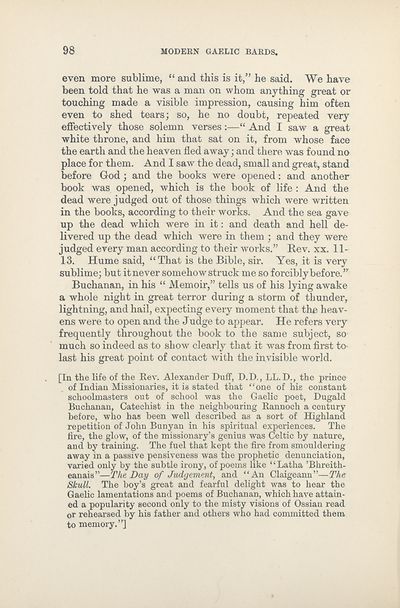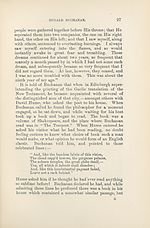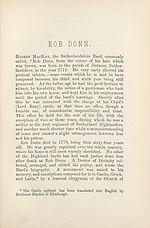Books and other items printed in Gaelic from 1871 to 1900 > Gaelic bards, and original poems
(132) Page 98
Download files
Complete book:
Individual page:
Thumbnail gallery: Grid view | List view

98
MODERN GAELIC BARDS.
even more sublime, “ and this is it,” he said. We have
been told that he was a man on whom anything great or
touching made a visible impression, causing him often
even to shed tears; so, he no doubt, repeated very
effectively those solemn verses:—“ And I saw a great
white throne, and him that sat on it, from whose face
the earth and the heaven fled away; and there was found no
place for them. And I saw the dead, small and great, stand
before God; and the books were opened: and another
book was opened, which is the book of life : And the
dead were judged out of those things which were written
in the books, according to their works. And the sea gave
up the dead which were in it: and death and hell de¬
livered up the dead which were in them ; and they were
judged every man according to their works.” Rev. xx. 11-
13. Hume said, “That is the Bible, sir. Yes, it is very
sublime; but it never somehow struck me so forcibly before.”
Buchanan, in his “ Memoir,” tells us of his lying awake
a whole night in great terror during a storm of thunder,
lightning, and hail, expecting every moment that the heav¬
ens were to open and the Judge to appear. He refers very
frequently throughout the book to the same subject, so
much so indeed as to show clearly that it was from first to
last his great point of contact with the invisible world.
[In the life of the Rev. Alexander Duff, D.D., LL.D., the prince
of Indian Missionaries, it is stated that “one of his constant
schoolmasters out of school was the Gaelic poet, Dugald
Buchanan, Catechist in the neighbouring Rannoch a century
before, who has been well described as a sort of Highland
repetition of John Bunyan in his spiritual experiences. The
fire, the glow, of the missionary’s genius was Celtic by nature,
and by training. The fuel that kept the fire from smouldering
away in a passive pensiveness was the prophetic denunciation,
varied only by the subtle irony, of poems like ‘1 Latha ’Bhreith-
eanais”—The Day of Judgement, and “An Claigeann”—The
Skull. The boy’s great and fearful delight was to hear the
Gaelic lamentations and poems of Buchanan, which have attain¬
ed a popularity second only to the misty visions of Ossian read
or rehearsed by his father and others who had committed them
to memory.”]
MODERN GAELIC BARDS.
even more sublime, “ and this is it,” he said. We have
been told that he was a man on whom anything great or
touching made a visible impression, causing him often
even to shed tears; so, he no doubt, repeated very
effectively those solemn verses:—“ And I saw a great
white throne, and him that sat on it, from whose face
the earth and the heaven fled away; and there was found no
place for them. And I saw the dead, small and great, stand
before God; and the books were opened: and another
book was opened, which is the book of life : And the
dead were judged out of those things which were written
in the books, according to their works. And the sea gave
up the dead which were in it: and death and hell de¬
livered up the dead which were in them ; and they were
judged every man according to their works.” Rev. xx. 11-
13. Hume said, “That is the Bible, sir. Yes, it is very
sublime; but it never somehow struck me so forcibly before.”
Buchanan, in his “ Memoir,” tells us of his lying awake
a whole night in great terror during a storm of thunder,
lightning, and hail, expecting every moment that the heav¬
ens were to open and the Judge to appear. He refers very
frequently throughout the book to the same subject, so
much so indeed as to show clearly that it was from first to
last his great point of contact with the invisible world.
[In the life of the Rev. Alexander Duff, D.D., LL.D., the prince
of Indian Missionaries, it is stated that “one of his constant
schoolmasters out of school was the Gaelic poet, Dugald
Buchanan, Catechist in the neighbouring Rannoch a century
before, who has been well described as a sort of Highland
repetition of John Bunyan in his spiritual experiences. The
fire, the glow, of the missionary’s genius was Celtic by nature,
and by training. The fuel that kept the fire from smouldering
away in a passive pensiveness was the prophetic denunciation,
varied only by the subtle irony, of poems like ‘1 Latha ’Bhreith-
eanais”—The Day of Judgement, and “An Claigeann”—The
Skull. The boy’s great and fearful delight was to hear the
Gaelic lamentations and poems of Buchanan, which have attain¬
ed a popularity second only to the misty visions of Ossian read
or rehearsed by his father and others who had committed them
to memory.”]
Set display mode to:
![]() Universal Viewer |
Universal Viewer | ![]() Mirador |
Large image | Transcription
Mirador |
Large image | Transcription
Images and transcriptions on this page, including medium image downloads, may be used under the Creative Commons Attribution 4.0 International Licence unless otherwise stated. ![]()
| Rare items in Gaelic > Books and other items printed in Gaelic from 1871 to 1900 > Gaelic bards, and original poems > (132) Page 98 |
|---|
| Permanent URL | https://digital.nls.uk/106038159 |
|---|
| Description | Out-of-copyright books printed in Gaelic between 1631 and 1900. Also some pamphlets and chapbooks. Includes poetry and songs, religious books such as catechisms and hymns, and different editions of the Bible and the Psalms. Also includes the second book ever published in Gaelic in 1631. |
|---|

